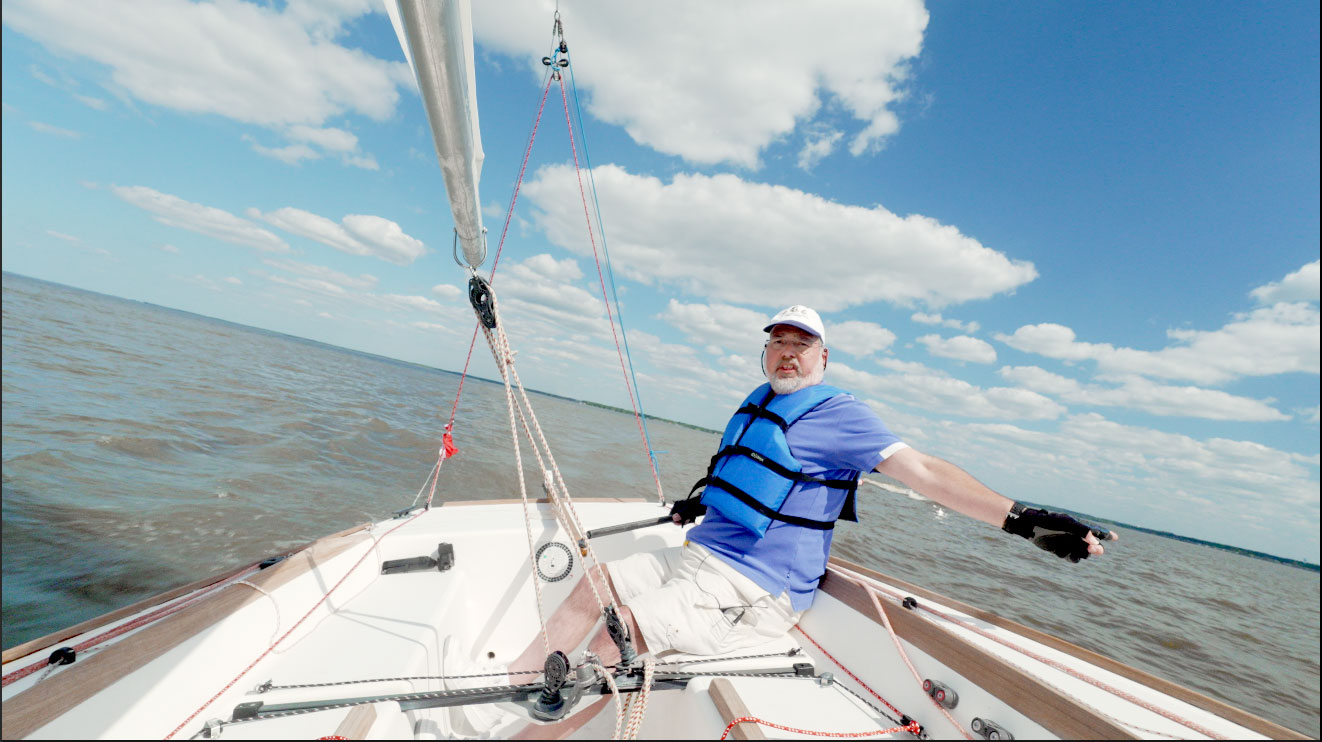As Dr. Scott Crawford enters his bedroom, adorned with photos of sailboats, nautical memorabilia and sailing decorations from wallpaper all the way down to the light switches, he is filled with a sense of peace and serenity.
 Crawford reminisces on his favorite pastime, navigating the waters in a sailboat with just him and his thoughts as he had done so often as a child. These are his fondest memories, but for years, that’s all they were – memories.
Crawford reminisces on his favorite pastime, navigating the waters in a sailboat with just him and his thoughts as he had done so often as a child. These are his fondest memories, but for years, that’s all they were – memories.
Following his multiple sclerosis diagnosis in 1999, Crawford, member of the CEDHARS Stakeholder Advisory Board, had his favorite hobby rapidly ripped away from him along with his career as a neuropsychologist, as if a strong riptide had washed over his entire identity.
In his new reality of limited mobility in a powerchair, Crawford relied on his bedroom, or sailboat shrine, to return him to his happy place that was cultivated as a 14-year-old boarding student in Greece.
“When I was young and able-bodied, I learned how to wind surf,” Crawford said. “I taught myself, and that was the biggest thrill of my life. From then on, I was hooked. It was my first love.”
Thanks to the Jackson Yacht Club, though, Crawford has been able to rekindle his lost love with adaptive sailing.
“It's literally the best thing that’s happened to me in two decades,” Crawford said. “It's enough to make life worth living for me. All of the challenges and difficulties and problems of the world just melt away when I'm on a boat.”
Adaptive sailing typically requires that the boat be rigged specifically to an individual’s ability, which can be inclusive of people who are paraplegic or quadriplegic. Sailboats are equipped with seats and seatbelts to accommodate people with mobility limitations. Adaptive boats also have special loops for the ropes, so people with disabilities can adjust to their needs. The J-22 Crawford sailed that day did not have such adaptive features, but it was nevertheless accommodating because of JYC sailors helping rig and operate the sails.
Jackson Yacht Club’s accessibility also extends to the docks, which feature steel ramps and boats that are raised out of the water on height adjustable winches.
“I’m able to transfer completely laterally just straight over, and it’s pretty simple for me,” Crawford said. “I mean, that's about as easy as transferring to a toilet or to a bed.”
Crawford’s excitement for a day out on the water is palpable, his unshakeable smile increasing as he gets closer to the boat. Somehow, though, he has found a deeper affinity for sailing post-disability onset.
“Sailing empowers people with disabilities to be in control when they so often aren't in control, and that's a beautiful thing for us,” he said. “It's very therapeutic just being free in the water and being able to move about and control where you're going.”
Crawford encourages everyone, especially those living with disability, to experience sailing. It does wonders not just for his mental health but also his physical health.
“It makes me use my muscles, it makes me hold and grasp and pull, and it engages all my core muscles,” he said. “You really have to hold your trunk up, you have to lean, you have to be able to switch sides. And you know, all of that takes a lot of effort for somebody with MS. But it's also really therapeutic from an emotional perspective. For me, it's about the most therapeutic thing there is.”
Although Crawford’s bedroom encompassed in a sailing motif provides comfort and nostalgia, it can’t replace the sun kissing his skin. It can’t replace the wind guiding the boat. It can’t replace the waves splashing the boat. It can’t replace the smile seemingly tattooed on his face as he gets ready to set off for a sail filled with indescribable bliss.
“People with disabilities, especially people with mobility disabilities, are often trapped at home,” he said. “We spend so much time at home in four walls, and it feels like house arrest. We rarely get the opportunity to go out and be in nature to see trees and grass and hear birds with no technology to speak of. That's an important part of life. It's therapeutic for people to get out in nature. This is pure freedom. It’s worth its weight in gold.”

